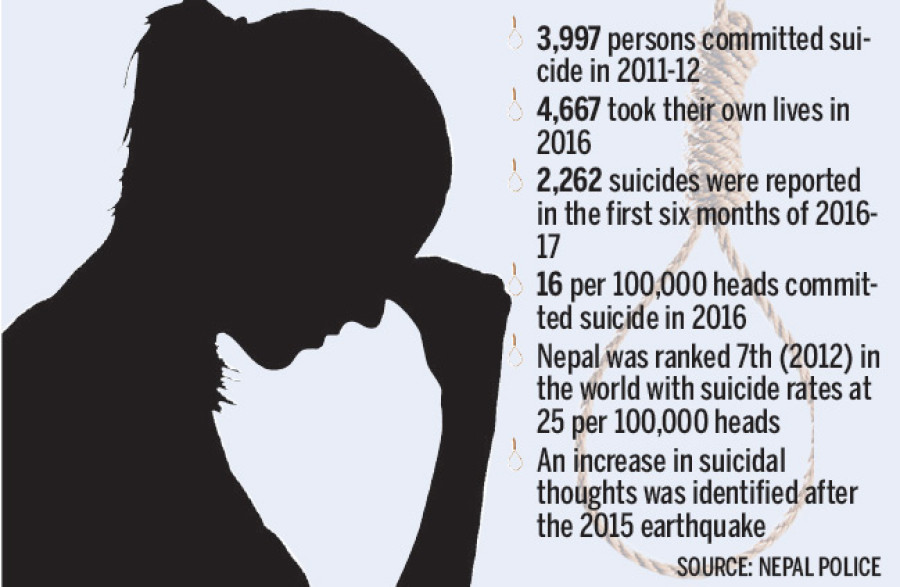National
World Health Day: Growing suicide rates major cause for concern
A woman committed suicide at National Trauma Centre in the Capital on Thursday. According to police, Jay Kala Gharti Magar of Baglung was found hanging.
Manish Gautam
A woman committed suicide at National Trauma Centre in the Capital on Thursday. According to police, Jay Kala Gharti Magar of Baglung was found hanging. She was admitted to the orthopaedic unit. The reason for suicide was yet to be ascertained, but doctors believe she could have hanged herself for the fear she would not be able to pay for her treatment, which could have triggered anxiety.
Suicide rate in Nepal has gone up in the last five years, with majority of deaths linked to depression and other mental health problems, which experts say is a major cause for concern.
Data from Nepal Police show that a total of 3,997 persons committed suicide in fiscal year 2011-12 and the number grew to 4,667 in 2015-16. The six-month data of Nepal police for this fiscal year show that 2,262 people committed suicide.
Suicide by hanging also is found to have gone up notably with others reported to have taken their own lives by consuming poison.
Mental health issues, including depression, are not often talked openly in Nepali society and failure to address these problems lead to suicide, experts say.
Considering the direct relation between mental health and suicide, this year’s theme for the World Health Day, which will be observed on Friday, is “Depression: Let’s Talk”.
In a statistical model developed by the World Health Organisation in 2012, Nepal was ranked seventh in the world with suicide rates at 25 per 100,000 heads.
Data compiled by the Ministry of Health in 2008-09 showed that 20 people out of every 100,000 who took their own lives were women.
“Many international studies show that women are more likely to be diagnosed with depression and anxiety disorders. This, if not managed, could lead to suicide,” said Dr Pawan Sharma, a psychiatrist at the Patan Academy of Health Sciences.
Given the enormity of the problem, experts said it is essential to understand the factors that cause depression and that people with depression and anxiety symptoms must be encouraged to seek medical attention as well as counselling.
“Depression, like any other physical ailments, is treatable,” said Dr Saroj Ojha, head of the Department of Psychiatry of the Institute of Medicine. “Medication is one way to treat such people, but counselling is vital. Patients should be encouraged to talk about the problems they are facing with the ones they feel comfortable and see a doctor or counsellor.”
Socio-cultural factors including poverty, unemployment, political instability and lack of opportunities among others are some of the causative agents of depression, said experts.
The decade-long war and frequent disasters, including the 2015 quake, also spiked mental health problems among Nepalis. A 2016 study conducted by the International Medical Corps showed that 25 percent of the people in Gorkha and Sindhupalchok saw higher number of people thinking about committing suicide.
- Anxiety symptoms, disturbed sleep and appetite and may have feelings of guilt or low self-worth, poor concentration and even medically unexplained symptoms
- An individual with a mild depressive episode will have some difficulty in continuing with ordinary work and social activities, but will probably not cease to function completely
- During a severe depressive episode, it is very unlikely that the sufferer will be able to continue with social, work, or domestic activities, except to a very limited extent




 9.7°C Kathmandu
9.7°C Kathmandu














